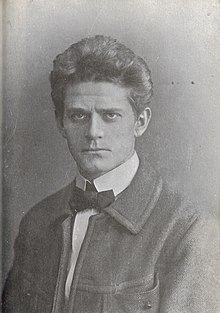Friedrich Kayssler
Friedrich Kayßler | |
|---|---|
 | |
| Born | 7 April 1874 |
| Died | 30 April 1945 (aged 71) |
| Occupation | Actor |
| Years active | 1913–1945 |
Friedrich Kayßler (7 April 1874 – 30 April 1945) was a German theatre and film actor. He appeared in 56 films between 1913 and 1945.
Biography
Kayßler was born in Neurode in the Prussian Silesia Province (now Nowa Ruda in Poland). He attended the gymnasium in Breslau (Wrocław), where he became a close friend of Christian Morgenstern and Fritz Beblo. Graduating in 1893 Kayßler studied philosophy at the universities of Breslau and Munich and began his theatre career at the Deutsches Theater in Berlin under manager Otto Brahm, later working at municipal theatres in Görlitz and Halle.
At the Deutsches Theater, Kayßler had made friends with director Max Reinhardt, whose Schall und Rauch Kabarett ensemble in Berlin he joined in 1901. He followed Reinhardt, when he became manager of the Deutsches Theater in 1905, where Kayßler performed in Kleist's The Prince of Homburg, Goethe's Faust and Ibsen's Peer Gynt. He also succeeded Reinhardt as manager of the Berlin Volksbühne from 1918 until 1923. He first appeared as a film actor in the silent movie Welche sterben, wenn sie lieben in 1913 and wrote several poems and dramas.
In March 1944 his son Christian, who was also a popular film actor, was killed in an allied bombing raid. Kayßler was named as one of the Third Reich's most important artists in the Gottbegnadeten list of September 1944. During the Battle of Berlin he was murdered by Red Army troops at his house in the suburb of Kleinmachnow, when he tried to protect his wife.[1]
Selected filmography
- The Tunnel (1915)
- Tragedy in the House of Habsburg (1924)
- Gräfin Donelli (1924)
- Mother and Child (1924)
- Destiny (1925)
- Assassination (1927)
- A Modern Dubarry (1927)
- The Burning Heart (1929)
- Zwei Menschen (1930)
- The Flute Concert of Sans-Souci (1930)
- Der Hauptmann von Köpenick (1931)
- Yorck (1931)
- 24 Hours in the Life of a Woman (1931)
- Louise, Queen of Prussia (1931)
- The Man Who Murdered (1931)
- The Eleven Schill Officers (1932)
- Marshal Forwards (1932)
- Peer Gynt (1934)
- Gold (1934)
- The Higher Command (1935)
- The Girl from the Marsh Croft (1935)
- The Broken Jug (1937)
- The Hound of the Baskervilles (1937)
- Anna Favetti (1938)
- Covered Tracks (1938)
- The Fox of Glenarvon (1940)
Works
- Simplicius (1905)
- Sagen aus Mijnhejm (1909)
- Schauspielernotizen (1910–1914)
- Jan der Wunderbare (1917)
- Zwischen Tal und Berg der Welle (1917)
- Stunden in Jahren (1924)
